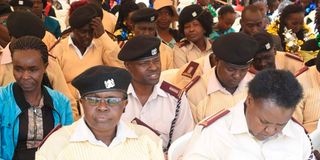
Chiefs and assistant chiefs from Ndhiwa, Rangwe and Homa Bay Sub-counties during a training session at Kabunde Social Hall in Homa Bay town on January 7, 2023.
Your area chief and all his or her superiors will now have police officers at their disposal following a policy reversal announced on Friday.
Since 2018 when 24,000 Administration Police (AP) officers were transferred to general duties, hitherto weakened chiefs have not had direct control of police officers in carrying out their functions.
President William Ruto last year flagged this as a major challenge to law enforcement and asked the Interior ministry to work out a way of getting police to support chiefs in “managing security and enforcing laws within administrative units in the country”.
As a result of the President’s August 20, 2024 order, a new police unit known as the National Government Administration Police Unit (Ngapu) is now in place.
With it, chiefs are likely to bounce back to levels that were at their apex during the President Daniel Moi’s Kanu era.
The police unit will serve assistant chiefs, chiefs, assistant county commissioners, deputy county commissioners, and county commissioners — who are called National Government Administration Officers (Ngaos) as per the National Government Co-Ordination Act.
The new unit was announced in Diani, Kwale County, during the launch of the Administration Police strategic plan for 2025-2028 in an event attended by Interior Cabinet Secretary Kipchumba Murkomen, Interior Principal Secretary Raymond Omollo, Inspector General of Police Douglas Kanja and his deputy Gilbert Masengeli (who commands the AP), Independent Policing Oversight Authority Chairman Issack Hassan among other top officials in the country’s security apparatus.
According to a presentation made at the event, the creation of the unit is within the powers given to the Inspector-General of Police under the National Police Service Act.

Interior Cabinet Secretary Kipchumba Murkomen, Inspector General of Police Douglas Kanja and PS Raymond Omollo during the launch of Administration Police strategic plan for 2025-2028 in Diani, Kwale County on January 24, 2025.
The implementation plan revealed that at the start of the deployment, 6,000 officers drawn from the Administration Police will be placed in the new unit. They will start their work immediately.
Next after the deployment of the 6,000 will be the deployment of standard operating procedures. This will be followed by reorientation and retraining of the affected officers. Afterwards, some 13,000 more will be recruited in two phases to make a 19,000-strong team.
When the unit is fully established, the Rift Valley, which has 249 divisions, will require the highest number of the Ngapu officers at 4,980. Nairobi would need 600, Western (1,800); Nyanza (2,720); Central (2,600); Eastern (4,060); North Eastern (1,540); while the Coast will take 1,440.
A command structure seen by Nation indicates that at the top-most of the new unit will be the Deputy IG in charge of the AP.
Thus, the headquarters of the unit will be in Nairobi.
Under the Deputy IG will be the National Government Administration Police Unit commandant, who will still be in the AP.
Under the national commandant will be the officers in charge of APs in the regions, counties, sub-counties, divisions and locations in that order. That means that in its immediate implementation, the unit will use the existing AP hierarchy from the regional level downwards.
Mr Murkomen said the new unit will strengthen service delivery.
“The government knows that the Administration Police is a key sector of the country’s security. We have a long history between the Administration Police and Ngaos. Today, we launch Ngapu to fill gaps and support government agencies in enforcing national government duties. This includes maintaining law and order, solving conflicts, and fighting illicit brews,” said Mr Murkomen.
Combat banditry
“A chief told me at home during the holidays that she was unable to deal with a local illicit brew den. This new unit will empower them to address such issues. I think we should also find space for the national police reservists in this particular function so that they are linked to the new unit,” he added.
Mr Murkomen also highlighted the challenge of politicians using criminal gangs in their pursuit of power.
He praised the Administration Police for making the country proud, particularly in their efforts to combat banditry in the North Rift.
Dr Omollo noted that the APs will work with chiefs to “better resolve conflicts”.
And according to Mr Masengeli, the new unit will significantly bolster local security.
Mr Hassan, the Ipoa board chairman, assured Kenyans that chiefs and their system would not become overly powerful, as was experienced in the early 2000s.
“I remember in the 2000s, Provincial Commissioners had so much power because they had police officers with them. Kenyans fear the return of that era. I want to assure Kenyans that we have checks in place, and this will not happen,” said Mr Hassan.
Speakers humorously likened the reunion of the AP and chiefs to ex-lovers reuniting after a long separation.

Chiefs and assistant chiefs during the African Institute of Research and Development Studies 7th Graduation Ceremony at Eldoret Sports Club in Uasin Gishu County on October 21, 2022.
“This is a very key moment for us. Being apart for more than a decade, this pronouncement today is quite emotional. However, it means we have a lot of work to do to get back to where we were,” said Ms Ann Ngetich, one of the attendants.
The 2018 changes that took APs away from chiefs, which happened under President Uhuru Kenyatta, also saw all chiefs’ camps turned into police posts.
However, the chiefs have been complaining about the changes, insisting that the merging of the regular police and APs under the leadership of the Inspector-General compromised their security.
In November 2022, the then Interior Cabinet Secretary Kithure Kindiki announced a new governance structure for more than 6,000 chiefs across Kenya to bolster their work, improve security at the grassroots and help in intelligence gathering.
Each of the chiefs was to have at least five armed police officers at their disposal to help them in enforcing law and order. That would translate to at least 30,000 officers attached to chiefs across the country.
The promise was, however, not achieved owing to limited resources within the police service. Then in August last year, Dr Ruto issued the directive that led to the formation of the new unit.
Additional reporting by Ndubi Moturi










